University Ethnographic Study: Social Diversity Among College Students
VerifiedAdded on 2023/04/21
|6
|1435
|257
Project
AI Summary
This assignment presents an ethnographic study focused on the level of social diversity among college students. The research employs qualitative methods, including non-participant observation and grounded theory, to analyze student interactions and behaviors within campus settings. The study explores the influence of factors like gatekeepers and research bargains on the research process. The researcher aims to understand the cultural and social measures of diversity and how they define relationships among students. The study's methodology involves observing students in the campus square and student center, assessing front-stage and backstage behaviors based on developed diversity indicators. The findings aim to provide insights into the social and psychological levels of diversity among the student population. The paper also includes a detailed ethnographic plan outlining the observation schedule and references relevant literature on ethnographic research and diversity.
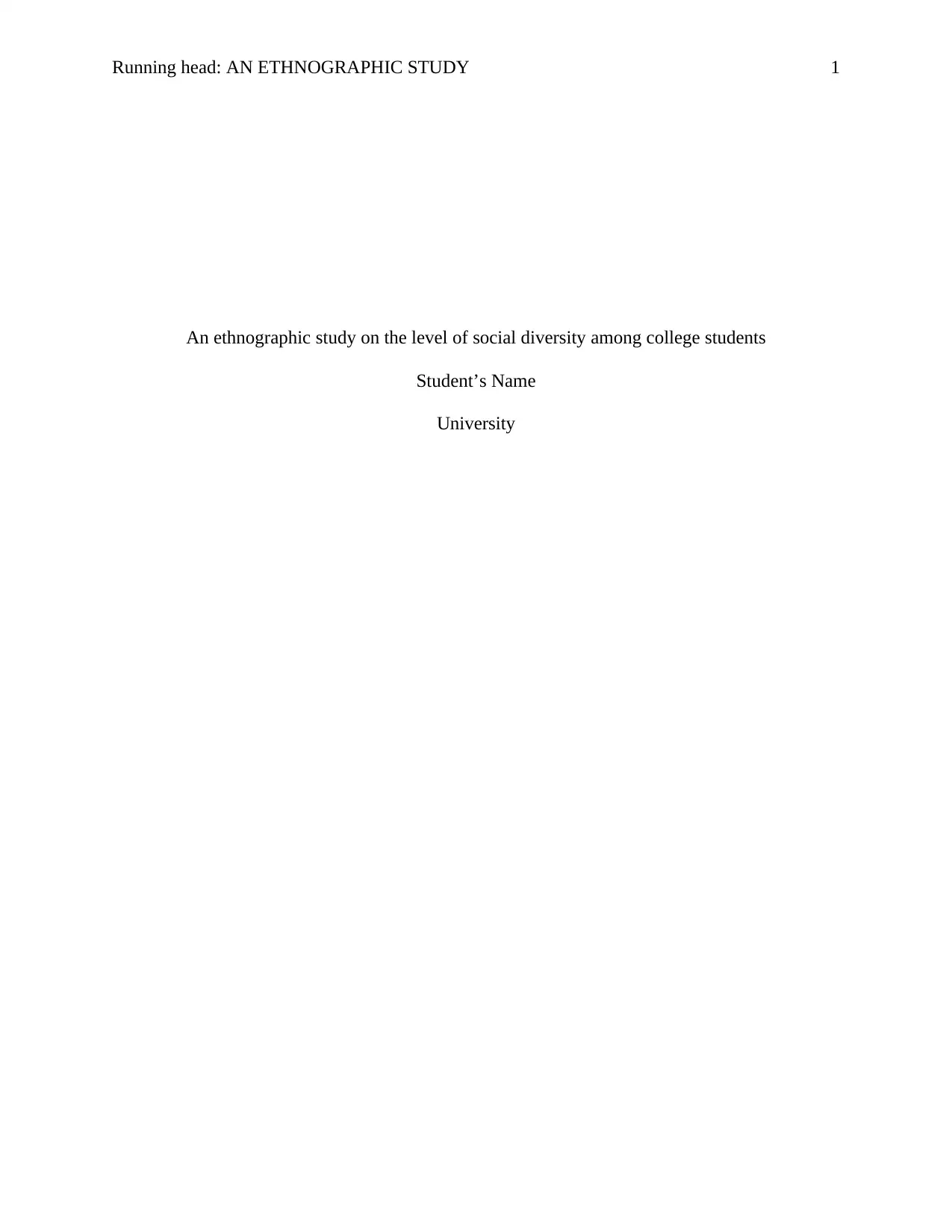
Running head: AN ETHNOGRAPHIC STUDY 1
An ethnographic study on the level of social diversity among college students
Student’s Name
University
An ethnographic study on the level of social diversity among college students
Student’s Name
University
Paraphrase This Document
Need a fresh take? Get an instant paraphrase of this document with our AI Paraphraser
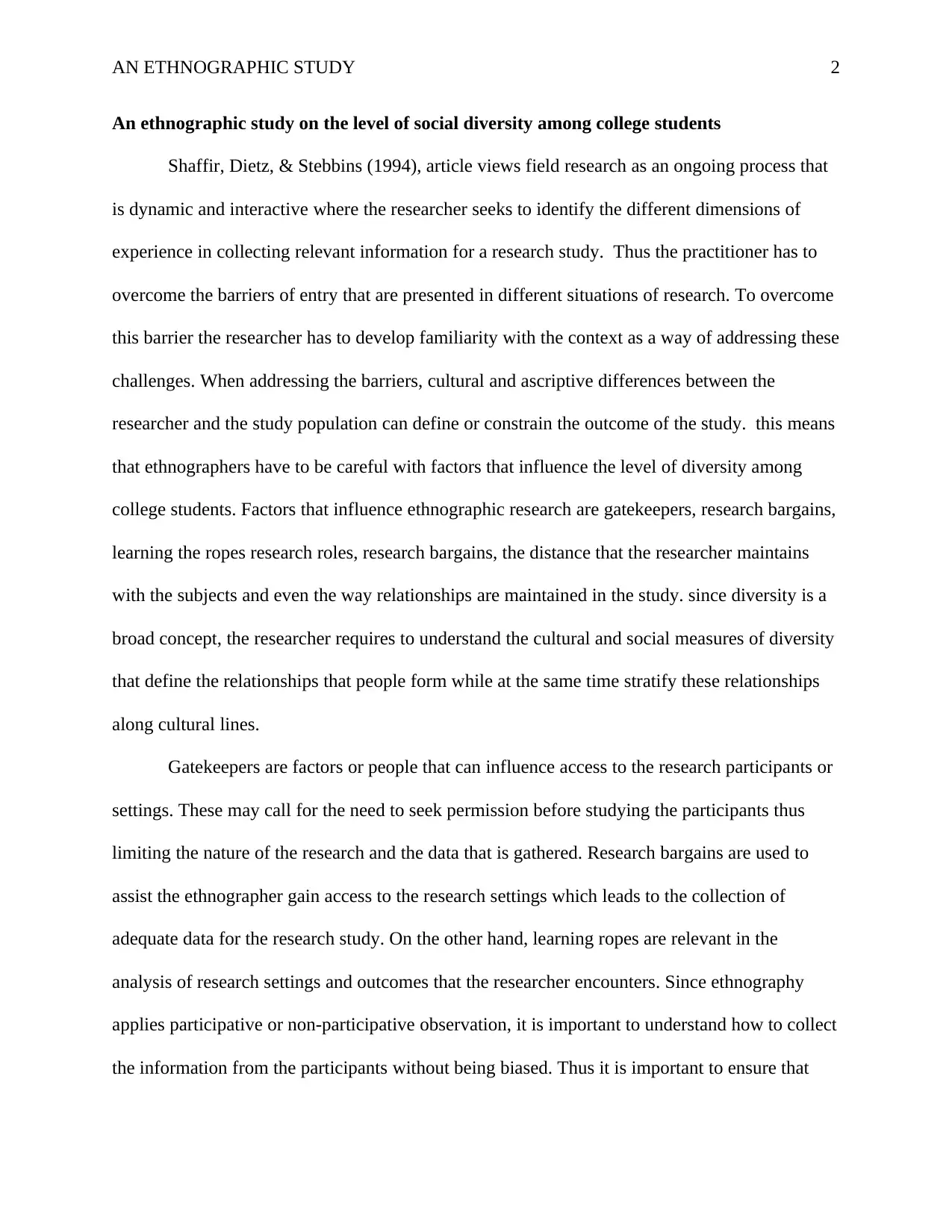
AN ETHNOGRAPHIC STUDY 2
An ethnographic study on the level of social diversity among college students
Shaffir, Dietz, & Stebbins (1994), article views field research as an ongoing process that
is dynamic and interactive where the researcher seeks to identify the different dimensions of
experience in collecting relevant information for a research study. Thus the practitioner has to
overcome the barriers of entry that are presented in different situations of research. To overcome
this barrier the researcher has to develop familiarity with the context as a way of addressing these
challenges. When addressing the barriers, cultural and ascriptive differences between the
researcher and the study population can define or constrain the outcome of the study. this means
that ethnographers have to be careful with factors that influence the level of diversity among
college students. Factors that influence ethnographic research are gatekeepers, research bargains,
learning the ropes research roles, research bargains, the distance that the researcher maintains
with the subjects and even the way relationships are maintained in the study. since diversity is a
broad concept, the researcher requires to understand the cultural and social measures of diversity
that define the relationships that people form while at the same time stratify these relationships
along cultural lines.
Gatekeepers are factors or people that can influence access to the research participants or
settings. These may call for the need to seek permission before studying the participants thus
limiting the nature of the research and the data that is gathered. Research bargains are used to
assist the ethnographer gain access to the research settings which leads to the collection of
adequate data for the research study. On the other hand, learning ropes are relevant in the
analysis of research settings and outcomes that the researcher encounters. Since ethnography
applies participative or non-participative observation, it is important to understand how to collect
the information from the participants without being biased. Thus it is important to ensure that
An ethnographic study on the level of social diversity among college students
Shaffir, Dietz, & Stebbins (1994), article views field research as an ongoing process that
is dynamic and interactive where the researcher seeks to identify the different dimensions of
experience in collecting relevant information for a research study. Thus the practitioner has to
overcome the barriers of entry that are presented in different situations of research. To overcome
this barrier the researcher has to develop familiarity with the context as a way of addressing these
challenges. When addressing the barriers, cultural and ascriptive differences between the
researcher and the study population can define or constrain the outcome of the study. this means
that ethnographers have to be careful with factors that influence the level of diversity among
college students. Factors that influence ethnographic research are gatekeepers, research bargains,
learning the ropes research roles, research bargains, the distance that the researcher maintains
with the subjects and even the way relationships are maintained in the study. since diversity is a
broad concept, the researcher requires to understand the cultural and social measures of diversity
that define the relationships that people form while at the same time stratify these relationships
along cultural lines.
Gatekeepers are factors or people that can influence access to the research participants or
settings. These may call for the need to seek permission before studying the participants thus
limiting the nature of the research and the data that is gathered. Research bargains are used to
assist the ethnographer gain access to the research settings which leads to the collection of
adequate data for the research study. On the other hand, learning ropes are relevant in the
analysis of research settings and outcomes that the researcher encounters. Since ethnography
applies participative or non-participative observation, it is important to understand how to collect
the information from the participants without being biased. Thus it is important to ensure that
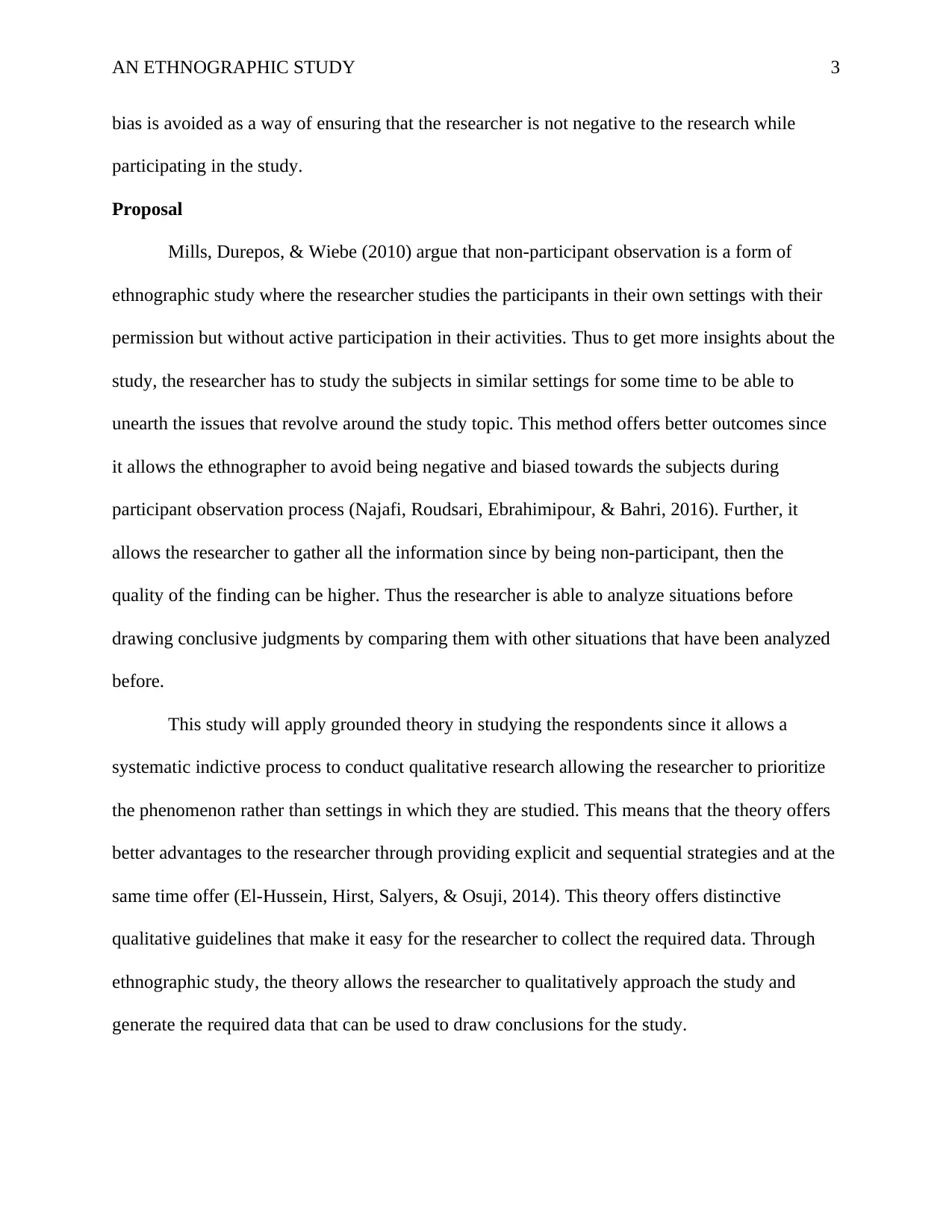
AN ETHNOGRAPHIC STUDY 3
bias is avoided as a way of ensuring that the researcher is not negative to the research while
participating in the study.
Proposal
Mills, Durepos, & Wiebe (2010) argue that non-participant observation is a form of
ethnographic study where the researcher studies the participants in their own settings with their
permission but without active participation in their activities. Thus to get more insights about the
study, the researcher has to study the subjects in similar settings for some time to be able to
unearth the issues that revolve around the study topic. This method offers better outcomes since
it allows the ethnographer to avoid being negative and biased towards the subjects during
participant observation process (Najafi, Roudsari, Ebrahimipour, & Bahri, 2016). Further, it
allows the researcher to gather all the information since by being non-participant, then the
quality of the finding can be higher. Thus the researcher is able to analyze situations before
drawing conclusive judgments by comparing them with other situations that have been analyzed
before.
This study will apply grounded theory in studying the respondents since it allows a
systematic indictive process to conduct qualitative research allowing the researcher to prioritize
the phenomenon rather than settings in which they are studied. This means that the theory offers
better advantages to the researcher through providing explicit and sequential strategies and at the
same time offer (El-Hussein, Hirst, Salyers, & Osuji, 2014). This theory offers distinctive
qualitative guidelines that make it easy for the researcher to collect the required data. Through
ethnographic study, the theory allows the researcher to qualitatively approach the study and
generate the required data that can be used to draw conclusions for the study.
bias is avoided as a way of ensuring that the researcher is not negative to the research while
participating in the study.
Proposal
Mills, Durepos, & Wiebe (2010) argue that non-participant observation is a form of
ethnographic study where the researcher studies the participants in their own settings with their
permission but without active participation in their activities. Thus to get more insights about the
study, the researcher has to study the subjects in similar settings for some time to be able to
unearth the issues that revolve around the study topic. This method offers better outcomes since
it allows the ethnographer to avoid being negative and biased towards the subjects during
participant observation process (Najafi, Roudsari, Ebrahimipour, & Bahri, 2016). Further, it
allows the researcher to gather all the information since by being non-participant, then the
quality of the finding can be higher. Thus the researcher is able to analyze situations before
drawing conclusive judgments by comparing them with other situations that have been analyzed
before.
This study will apply grounded theory in studying the respondents since it allows a
systematic indictive process to conduct qualitative research allowing the researcher to prioritize
the phenomenon rather than settings in which they are studied. This means that the theory offers
better advantages to the researcher through providing explicit and sequential strategies and at the
same time offer (El-Hussein, Hirst, Salyers, & Osuji, 2014). This theory offers distinctive
qualitative guidelines that make it easy for the researcher to collect the required data. Through
ethnographic study, the theory allows the researcher to qualitatively approach the study and
generate the required data that can be used to draw conclusions for the study.
⊘ This is a preview!⊘
Do you want full access?
Subscribe today to unlock all pages.

Trusted by 1+ million students worldwide
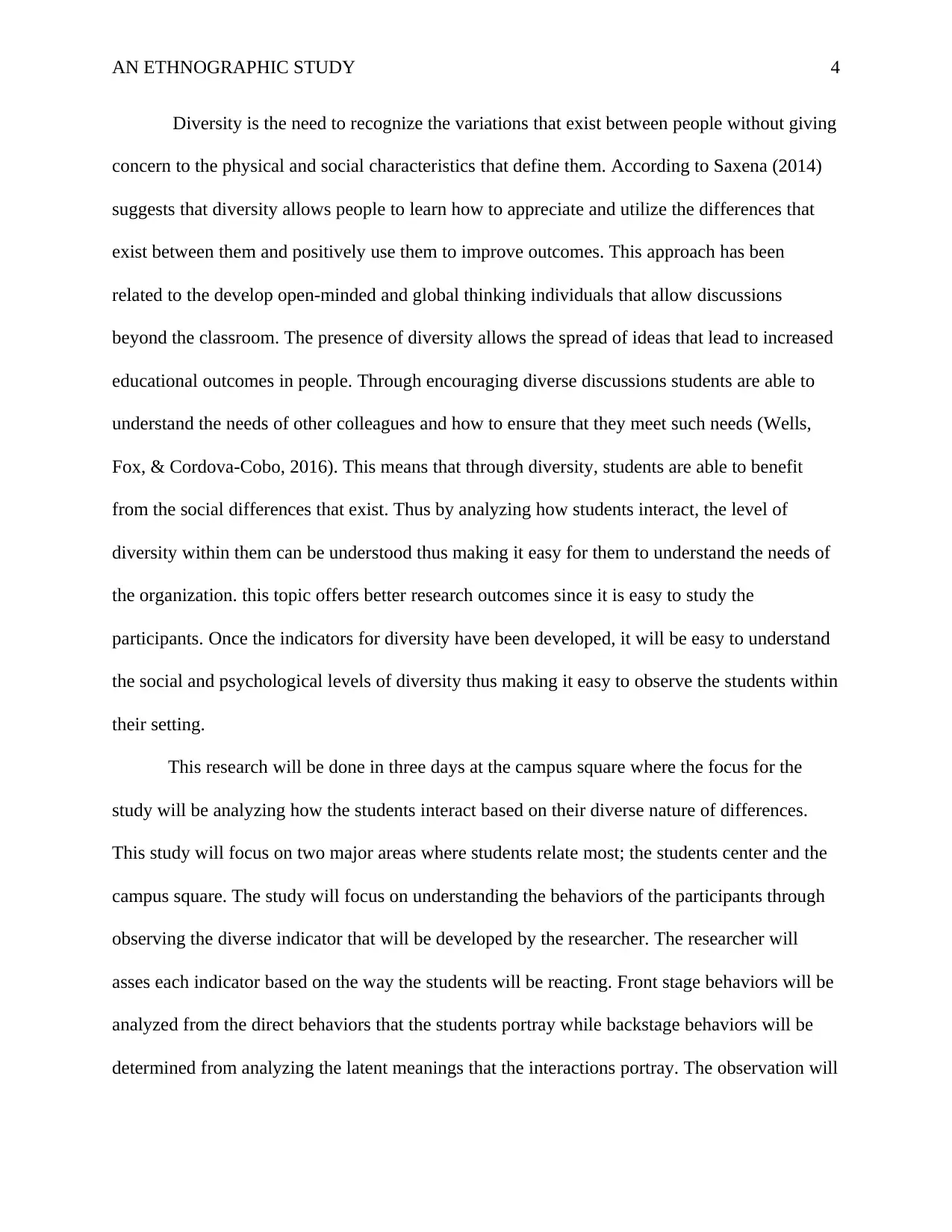
AN ETHNOGRAPHIC STUDY 4
Diversity is the need to recognize the variations that exist between people without giving
concern to the physical and social characteristics that define them. According to Saxena (2014)
suggests that diversity allows people to learn how to appreciate and utilize the differences that
exist between them and positively use them to improve outcomes. This approach has been
related to the develop open-minded and global thinking individuals that allow discussions
beyond the classroom. The presence of diversity allows the spread of ideas that lead to increased
educational outcomes in people. Through encouraging diverse discussions students are able to
understand the needs of other colleagues and how to ensure that they meet such needs (Wells,
Fox, & Cordova-Cobo, 2016). This means that through diversity, students are able to benefit
from the social differences that exist. Thus by analyzing how students interact, the level of
diversity within them can be understood thus making it easy for them to understand the needs of
the organization. this topic offers better research outcomes since it is easy to study the
participants. Once the indicators for diversity have been developed, it will be easy to understand
the social and psychological levels of diversity thus making it easy to observe the students within
their setting.
This research will be done in three days at the campus square where the focus for the
study will be analyzing how the students interact based on their diverse nature of differences.
This study will focus on two major areas where students relate most; the students center and the
campus square. The study will focus on understanding the behaviors of the participants through
observing the diverse indicator that will be developed by the researcher. The researcher will
asses each indicator based on the way the students will be reacting. Front stage behaviors will be
analyzed from the direct behaviors that the students portray while backstage behaviors will be
determined from analyzing the latent meanings that the interactions portray. The observation will
Diversity is the need to recognize the variations that exist between people without giving
concern to the physical and social characteristics that define them. According to Saxena (2014)
suggests that diversity allows people to learn how to appreciate and utilize the differences that
exist between them and positively use them to improve outcomes. This approach has been
related to the develop open-minded and global thinking individuals that allow discussions
beyond the classroom. The presence of diversity allows the spread of ideas that lead to increased
educational outcomes in people. Through encouraging diverse discussions students are able to
understand the needs of other colleagues and how to ensure that they meet such needs (Wells,
Fox, & Cordova-Cobo, 2016). This means that through diversity, students are able to benefit
from the social differences that exist. Thus by analyzing how students interact, the level of
diversity within them can be understood thus making it easy for them to understand the needs of
the organization. this topic offers better research outcomes since it is easy to study the
participants. Once the indicators for diversity have been developed, it will be easy to understand
the social and psychological levels of diversity thus making it easy to observe the students within
their setting.
This research will be done in three days at the campus square where the focus for the
study will be analyzing how the students interact based on their diverse nature of differences.
This study will focus on two major areas where students relate most; the students center and the
campus square. The study will focus on understanding the behaviors of the participants through
observing the diverse indicator that will be developed by the researcher. The researcher will
asses each indicator based on the way the students will be reacting. Front stage behaviors will be
analyzed from the direct behaviors that the students portray while backstage behaviors will be
determined from analyzing the latent meanings that the interactions portray. The observation will
Paraphrase This Document
Need a fresh take? Get an instant paraphrase of this document with our AI Paraphraser

AN ETHNOGRAPHIC STUDY 5
be carried out through seeking permission from the university department while at the same time
assessing the viability of the defined indicators with the instructor. Gatekeeping will not be
relevant since the ethnography will be doing in open grounds. To remain unbiased, Mannik &
McGarry (2017) suggest that the researcher will record the details of the research as it appears in
the front stage rather than recording information that fits the research study. This means that the
focus is on ensuring that the information collected meets the needs of the study.
Ethnographic plan
day place time
Day 1 Campus square 5-6pm
Day 2 Campus square 5-6pm
Day 3 Student’s center 5-6pm
be carried out through seeking permission from the university department while at the same time
assessing the viability of the defined indicators with the instructor. Gatekeeping will not be
relevant since the ethnography will be doing in open grounds. To remain unbiased, Mannik &
McGarry (2017) suggest that the researcher will record the details of the research as it appears in
the front stage rather than recording information that fits the research study. This means that the
focus is on ensuring that the information collected meets the needs of the study.
Ethnographic plan
day place time
Day 1 Campus square 5-6pm
Day 2 Campus square 5-6pm
Day 3 Student’s center 5-6pm
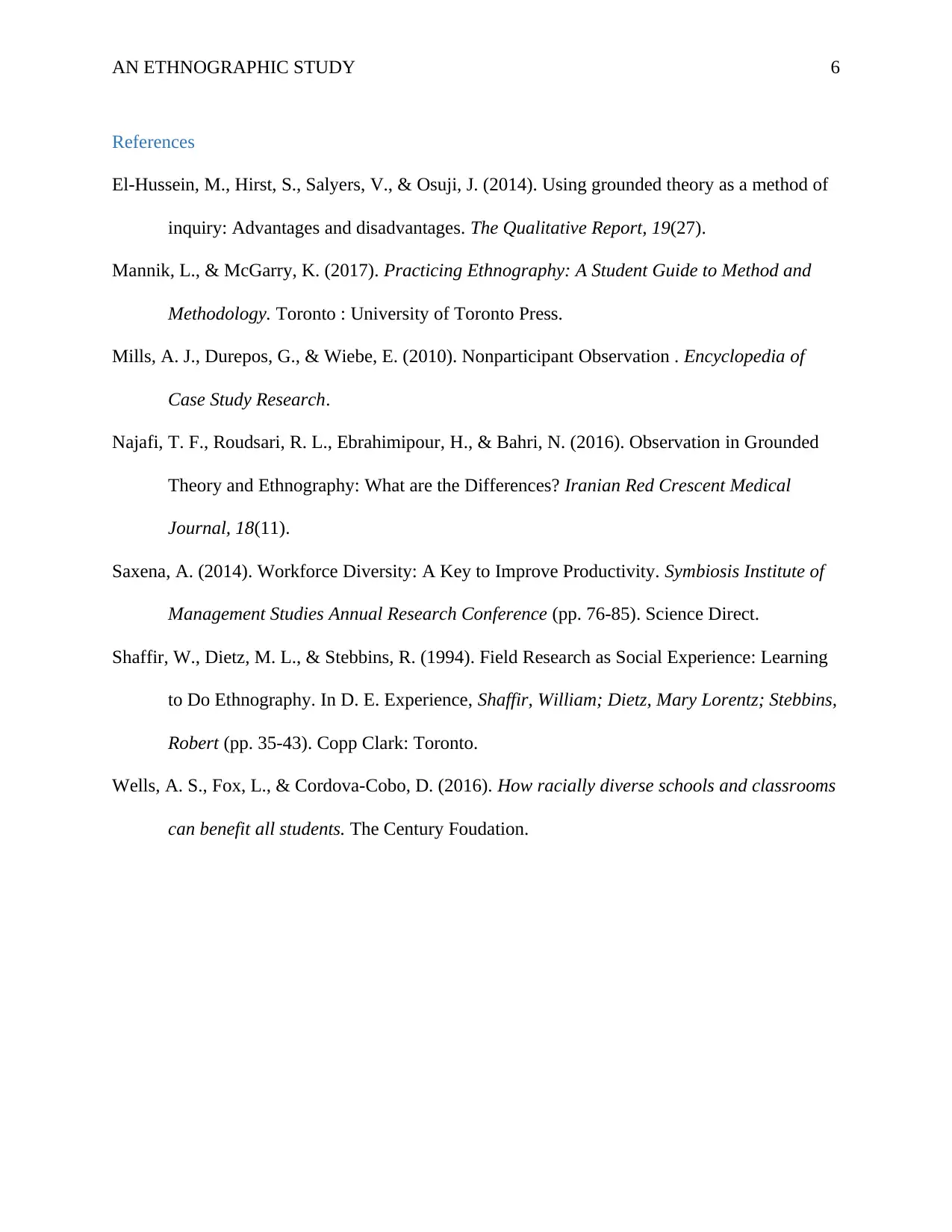
AN ETHNOGRAPHIC STUDY 6
References
El-Hussein, M., Hirst, S., Salyers, V., & Osuji, J. (2014). Using grounded theory as a method of
inquiry: Advantages and disadvantages. The Qualitative Report, 19(27).
Mannik, L., & McGarry, K. (2017). Practicing Ethnography: A Student Guide to Method and
Methodology. Toronto : University of Toronto Press.
Mills, A. J., Durepos, G., & Wiebe, E. (2010). Nonparticipant Observation . Encyclopedia of
Case Study Research.
Najafi, T. F., Roudsari, R. L., Ebrahimipour, H., & Bahri, N. (2016). Observation in Grounded
Theory and Ethnography: What are the Differences? Iranian Red Crescent Medical
Journal, 18(11).
Saxena, A. (2014). Workforce Diversity: A Key to Improve Productivity. Symbiosis Institute of
Management Studies Annual Research Conference (pp. 76-85). Science Direct.
Shaffir, W., Dietz, M. L., & Stebbins, R. (1994). Field Research as Social Experience: Learning
to Do Ethnography. In D. E. Experience, Shaffir, William; Dietz, Mary Lorentz; Stebbins,
Robert (pp. 35-43). Copp Clark: Toronto.
Wells, A. S., Fox, L., & Cordova-Cobo, D. (2016). How racially diverse schools and classrooms
can benefit all students. The Century Foudation.
References
El-Hussein, M., Hirst, S., Salyers, V., & Osuji, J. (2014). Using grounded theory as a method of
inquiry: Advantages and disadvantages. The Qualitative Report, 19(27).
Mannik, L., & McGarry, K. (2017). Practicing Ethnography: A Student Guide to Method and
Methodology. Toronto : University of Toronto Press.
Mills, A. J., Durepos, G., & Wiebe, E. (2010). Nonparticipant Observation . Encyclopedia of
Case Study Research.
Najafi, T. F., Roudsari, R. L., Ebrahimipour, H., & Bahri, N. (2016). Observation in Grounded
Theory and Ethnography: What are the Differences? Iranian Red Crescent Medical
Journal, 18(11).
Saxena, A. (2014). Workforce Diversity: A Key to Improve Productivity. Symbiosis Institute of
Management Studies Annual Research Conference (pp. 76-85). Science Direct.
Shaffir, W., Dietz, M. L., & Stebbins, R. (1994). Field Research as Social Experience: Learning
to Do Ethnography. In D. E. Experience, Shaffir, William; Dietz, Mary Lorentz; Stebbins,
Robert (pp. 35-43). Copp Clark: Toronto.
Wells, A. S., Fox, L., & Cordova-Cobo, D. (2016). How racially diverse schools and classrooms
can benefit all students. The Century Foudation.
⊘ This is a preview!⊘
Do you want full access?
Subscribe today to unlock all pages.

Trusted by 1+ million students worldwide
1 out of 6
Related Documents
Your All-in-One AI-Powered Toolkit for Academic Success.
+13062052269
info@desklib.com
Available 24*7 on WhatsApp / Email
![[object Object]](/_next/static/media/star-bottom.7253800d.svg)
Unlock your academic potential
Copyright © 2020–2026 A2Z Services. All Rights Reserved. Developed and managed by ZUCOL.





